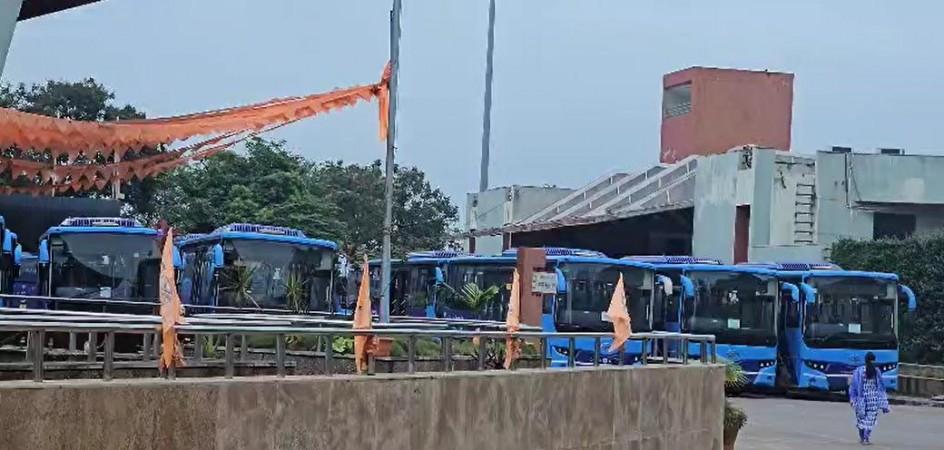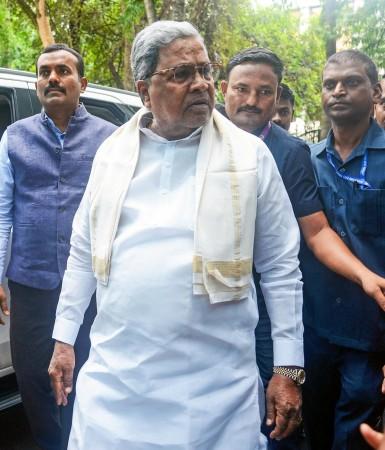
The indefinite strike by Karnataka's state-owned transport corporation employees has brought bus services across the state to a grinding halt. Initiated on Tuesday, the strike has caused significant disruption, leaving passengers stranded and struggling to find alternative means of transportation.
The employees, who are demanding a revision of their salaries and the release of 38 months' pending wages, have largely refrained from reporting to work. Despite a High Court order against the strike and the invocation of the Essential Services Maintenance Act (ESMA) by the state government, only a small fraction of the workforce has continued to operate.
The strike's impact is most pronounced in district headquarters, with Bengaluru and northern Karnataka districts experiencing severe disruptions. In an attempt to mitigate the situation, authorities have deployed private buses.
However, this solution has introduced new challenges, particularly for women passengers who are accustomed to free travel on government buses under the 'Shakti' scheme. Unlike the government services, private operators are charging women passengers, adding to their financial burden.

At Bengaluru's Majestic bus stand, the scene is chaotic as passengers arriving from other states find themselves stranded. These individuals, who rely on RTC buses to reach their destinations, are left with limited options. The Bengaluru Metropolitan Transport Corporation (BMTC) services have also been affected, although buses from Kempegowda International Airport (KIAL) to various city parts continue to operate, providing some relief to travelers.
In response to the crisis, the Transport Department has urged IT companies to allow employees to work from home. This measure has been somewhat effective, as many software professionals with access to cab facilities or Metro services have managed to reach their offices without major issues. Additionally, the Bengaluru Metro Rail Corporation Limited (BMRCL) has increased the frequency of its services to accommodate the surge in demand.
To further address the transportation crisis, the department is arranging for 11,000 private buses to operate on Tuesday and Wednesday, with 4,000 of these buses designated for Bengaluru city alone. This initiative aims to provide some relief to the commuting public, although its effectiveness in alleviating the widespread disruption remains to be seen.
Meanwhile, the legal and political dimensions of the strike are unfolding. A bench headed by the Chief Justice of the Karnataka High Court is scheduled to hear the matter later in the day. This follows two high-level meetings chaired by Chief Minister Siddaramaiah at Vidhana Soudha on Monday, which failed to produce a resolution. The RTC representatives have remained steadfast in their demands for salary revision and arrear payments, indicating a deep-seated frustration with the government's handling of their grievances.
The RTC unions have declared that 1.15 lakh employees across the state will participate in the strike, underscoring the scale of the discontent. The unions have also pointed out that a copy of the High Court order reached them late, which has contributed to the continuation of the strike. The RTC buses serve as a crucial mode of transportation for commuters, connecting cities with rural areas across Karnataka. The ongoing strike has therefore had a ripple effect, impacting not just urban commuters but also those in rural regions who rely on these services for their daily needs.
Adding another layer of complexity to the situation is the Congress-led state government's 'Shakti' scheme, which provides free travel for women. The budget allocation for this scheme has been increased from Rs 5,015 crore in 2024-25 to Rs 5,300 crore this year. However, the scheme has faced criticism from the BJP and JD(S), who allege that the state government is compromising the financial health of RTCs for electoral gains. In response, the Siddaramaiah government has refuted these allegations, asserting that the scheme has empowered millions of women and will not be withdrawn under any circumstances.
Related

















